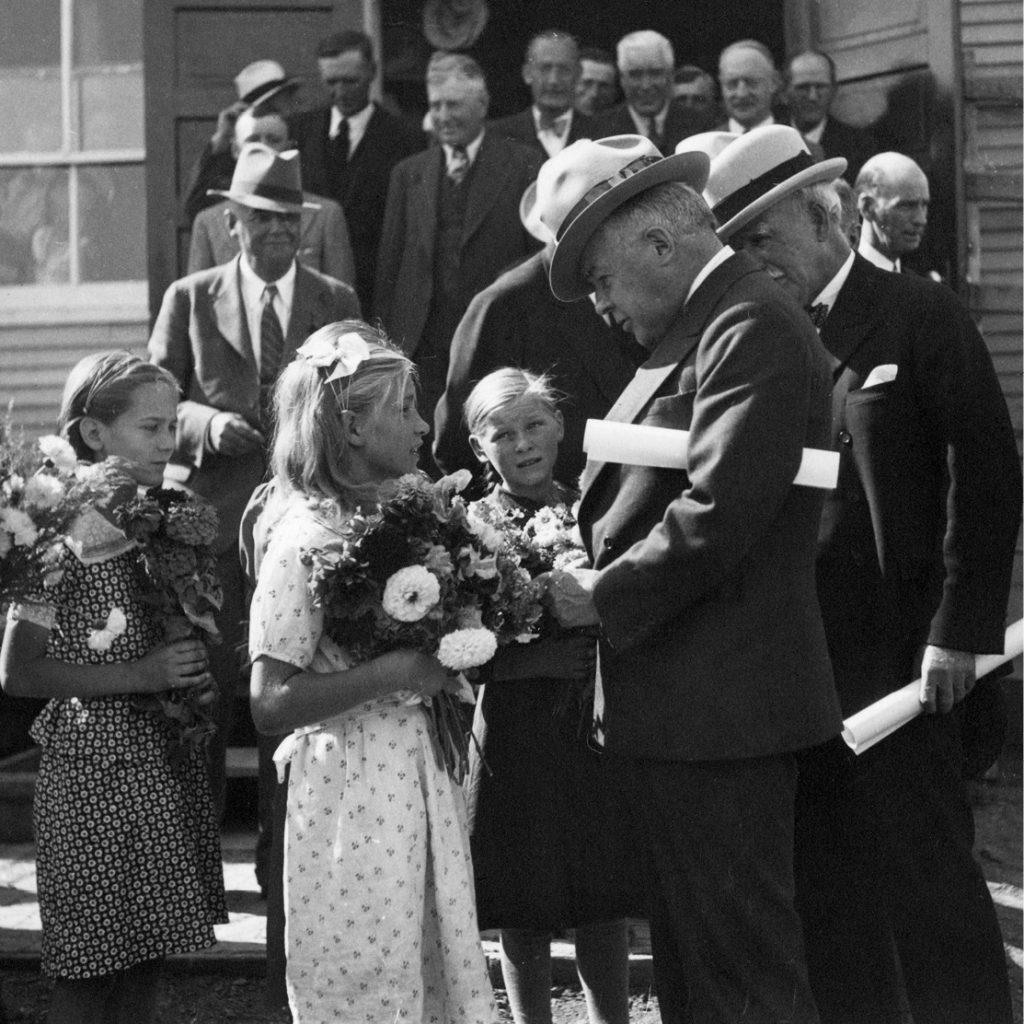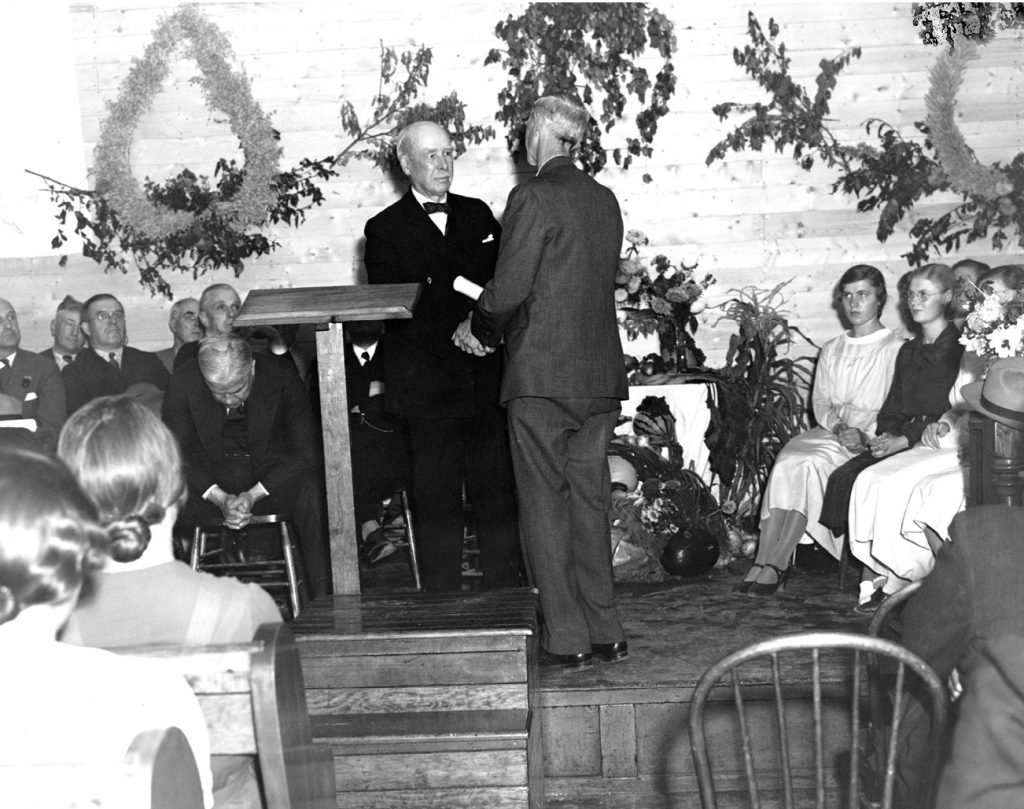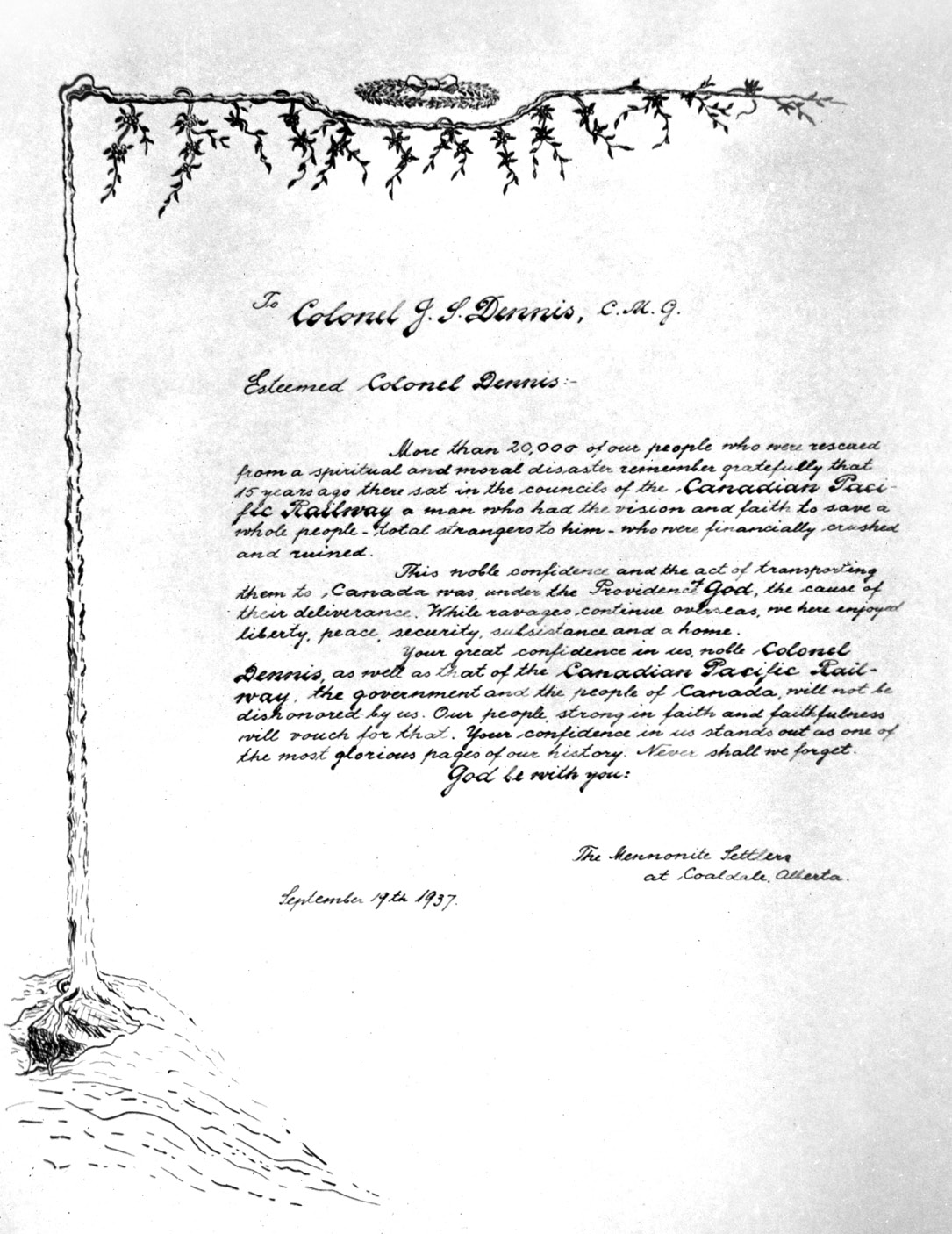Reflections on the CPR: Russlaender 100 Gala Dinner Address
Aileen Friesen
During the summer of 2023, the Mennonite Historical Society of Canada in partnership with TourMagination hosted a train trip across Canada, starting in Quebec City and ending in Abbotsford, to commemorate the centenary of the arrival of the Russlaender Mennonites from the Soviet Union to Canada. As a part of this historic trip, Canadian Pacific Kansas City (CPKC , formerly Canadian Pacific Railway) sponsored a gala dinner at the Fairmont Queen Elizabeth in Montreal on July 8th. As a member of the Russlaender Centenary Committee executive (along with Henry Paetkau, Ingrid Moehlmann, and Richard Thiessen), I was asked to deliver the evening’s keynote.
We are here tonight to pay tribute to a moment in history special to both Mennonites and the former Canadian Pacific Railway. On the surface, this is a story about money, about a time when you lent us a lot of money – $1,767,398.68, to be exact. Perhaps we should have been paying for this dinner instead of you. But it is about more than money. This is a tribute to the lives saved through this loan, the second chance given, the generations created, the contributions to Canadian society made.
During the 1920s, the CPR saved over thirteen thousand Mennonites by extending credit for travel, with another seven thousand paying their own way as cash passengers from the Soviet Union to Canada. Simple, right? That sentence does not begin to capture the significance of this moment. After years of tragedy, after a civil war that confirmed humanity’s inhumanity, after a famine that swelled the bellies of children, and after an epidemic that filled cemeteries, Mennonites carried scars, both seen and unseen. The adults who hoisted their travel trunks into freight cars moved not towards a future, but away from a past. Looking at photographs of the departures, at the train stations in Chortitza, in Lichtenau, it is clear who this migration is about. It is a migration of children. So many children, children who through a month-long trip to Canada were saved from the Soviet deportations still to come, saved from another famine, saved from the fate of losing their fathers through terror, saved from living through another devastating war. The migration gifted these children a future, which was not without its own challenges, without its own sacrifices. Yet, out of the ashes of revolution, out of the pain of loss, this new community in Canada refashioned its brokenness into a strong foundation for future generations. This is what the loan from the CPR made possible. This is the legacy that we are here to commemorate.
I speak of a loan, but in reality there were several contracts signed by CPR, represented by Colonel J. S. Dennis, and what would become the Canadian Mennonite Board of Colonization, represented by Bishop David Toews. The first one, the agreement that started this whole movement, engendered resistance from both the CPR brass and Canadian Mennonites. To the financial vice president of CPR, or the money guy, the plan was simply “one of Colonel Dennis’s crazy ideas.” Dennis was not young, he was about sixty-five when he spearheaded this crazy idea as the CPR’s commissioner of colonization and development. For some Canadian Mennonites, the contract to move nearly three thousand of their co-religionists for $370,000 dollars plus 6 percent interest, complete with a stringent repayment plan, demonstrated fiscal recklessness. Business leaders among Canadian Mennonites derided the plan, questioning Toews’s judgement. They weren’t wrong; this was a bad deal, and Toews knew it. For him, it was lives not money that held more sway; the cost of inaction far outweighed the burden of debt. With support from only part of the Canadian Mennonite community, Toews signed the contract, effectively starting, after years of disappointment, the migration movement of Mennonites from the Soviet Union to Canada.

The in-fighting among Mennonites was one of many setbacks that shaped the migration. Even before the CPR and the Canadian Mennonite Board of Colonization could consider the fiscal and logistical needs of moving people, Mennonites had to solve the problem of the 1919 orders-in-councils that had banned Mennonite immigration after the government determined them to be culturally toxic for Canada. It took a coordinated effort to petition those in power and those waiting in the wings of power to reconsider. Gerhard Ens, the Mennonite turned Swedenborgian politician, A. A. Friesen, a teacher from Halbstadt turned travelling salesman of the Russian Mennonite plight, Heinrich H. Ewert, the principal of Mennonite Collegiate Institute, S. F. Coffman, a Swiss Mennonite minister from Ontario, and others spent considerable time assuring government officials that these migrants were the right type of Mennonites, good citizens in contrast to the Old Colony Mennonites sparring with the governments in Manitoba and Saskatchewan over schools. In 1920, this plea failed to resonate, but by 1921, even J. A. Calder, the minister of immigration of the Union government in Ottawa, who had defended the ban in Parliament, expressed his willingness to talk it through with Mennonites. This was not necessary; an election in December brought a new government to power, and Mennonites, having secured the support of Mackenzie King’s Liberals, soon could once again immigrate to Canada. While the CPR left negotiations in the hands of Mennonites, it isn’t far-fetched to assume that they shook some hands in smoky men’s-only clubs on our behalf.
Changing Canada’s immigration policy was step one. And while it was a feat, we shouldn’t overemphasize its significance – Canadian government officials would soon realize that the British farmers their hearts desired did not want to come to Canada. They would open the door to other groups they found objectionable in the past, tasking the CPR and the Canadian National Railway with recruiting central and eastern European farmers to form another wave of colonization. This, by the way, had been Colonel Dennis’s dream. During the First World War, under Dennis’s instruction, the CPR had printed promotional materials in various languages, including German and Russian, in preparation for recruitment. The Bolshevik Revolution did little to quell those aspirations and the CPR would join a number of other transportation companies in forming a joint stock company, the Russian-Canadian-American Passenger Agency, which facilitated emigration from and immigration to the Soviet Union. Yes, some people wanted to leave Canada for the Soviet Union – in fact in Southhampton, England, my grandfather roomed briefly with a group of Ukrainians headed back. Not everyone viewed the Bolshevik Revolution in a negative light. In Moscow, CPR’s A. Ross Owen set up an office, where he could receive correspondence, including letters from CPR physician Dr. Edward Drury, who complained bitterly about how Mennonites misrepresented the distance between their villages as he checked their eyes for trachoma. Mennonites, of course, complained bitterly about Dr. Drury and the accuracy of his medical exams.

Just because the CPR was developing its global interests doesn’t mean that physically moving Mennonites was straightforward or uncomplicated. In the Mennonite Heritage Archives, we have stacks of correspondence, mainly, although not exclusively, between Toews and Dennis. It was a succession of crises, in which every train departing for the Soviet-Latvian border, every ship arriving in Quebec City or Saint John, New Brunswick, and every train travelling across Canada with Mennonite passengers represented a hard-fought victory. The ground was constantly shifting underneath the feet of Mennonites and their colleagues in the CPR: an outbreak of cholera in Odessa delayed the first group of Mennonites, causing a necessary rerouting of the migration, and spats between Soviet and Canadian officials over trade delegation visas, changes to Soviet protocols, and strict interpretations of Canadian regulations created a constant flow of problems requiring patience as well as decisive action. Colonel Dennis, ever the steady hand, informed and advised his Mennonite associates, and, perhaps most importantly, continued to support this project despite its many obstacles. If he regretted extending credit to Mennonites, he never said it to us. Even during tense moments of conflict between the Board and the CPR, and there were many, he calmly defused the situation, often reminding Mennonites that they were not the only ones with integrity.
The issue of money was often at the heart of these tensions. As the Canadian Mennonite Board of Colonization fell deeper into debt with the CPR, Dennis had to reprimand Mennonites on a number of occasions, even halting the flow of immigrants until Mennonites could find more funds to lower their debt. But instead of shutting down the enterprise, instead of deciding that the hassle was no longer worth the return, instead of prioritizing the many other groups being recruited to Canada during this time, including a large number of Ukrainians from the former Austro-Hungarian empire, the CPR continued to extend credit as fast as Mennonites could make repayments. For Mennonites, this meant that Toews especially, but also A. A. Friesen, begged anyone who would listen for donations or loans to lower the debt. Sometimes Dennis also intervened in these conversations, nudging wealthy but fiscally skeptical Canadian Mennonite business leaders to open their wallets in the name of the greater good.
And Mennonites did their best – well, David Toews, C. F. Klassen, and others did their best to cajole the Russlaender Mennonites into repaying the travel debt, known as the Reiseschuld, owed to the CPR. Toews, who believed so completely in God, and in his community, took on the responsibility of the debt, believing that Mennonites would keep their word and repay. In 1946, after CPR forgave nearly a million dollars in interest, they finally did.

If this was 1937, I could end with the following quote from the Mennonite Brethren Church in Coaldale, Alberta, which thanked CPR top executives, including Colonel Dennis: “Your confidence in us stands out as one of the most glorious pages of our history. Never shall we forget.” If this was 1946, I could end this presentation with the image of David Toews weeping when he learned that the travel debt to the CPR had been finally repaid. But it is 2023 and as we gather here in Tiohtià:ke (Montreal), the unceded territory of the Kanien’kehà:ka Nation, our ending must be different. When the Mennonite Historical Society of Canada decided to undertake this project, we made a commitment to acknowledge race and displacement as we retell our story; to acknowledge that the system which saved us hurt others. While we honour Dennis as a friend to Mennonites, we shouldn’t forget that Dennis became a colonel because of his actions against the North-West Resistance, in which the Métis under Louis Riel and his First Nations allies defended their communities against the Canadian government. While we can remember with nostalgia the Mackenzie King government rescinding the ban on Mennonites, we shouldn’t forget that just before the first train of Mennonites departed Chortitza, Soviet Ukraine, for the long journey to Rosthern, Saskatchewan, the government of Canada passed what would become known colloquially as the Chinese Exclusion Act, cutting off the possibility of immigration for a people who had contributed so much to the building of the railway in the west. And while we can express our gratitude to the CPR for making the seemingly impossible possible, we can acknowledge that the railway supported the settler movement, which benefitted the Russlaender and directly contributed to the displacement of Indigenous Nations, causing a legacy of pain. The inequalities of this period, of who should be allowed to immigrate, who should be allowed to settle the land, who should be allowed to preserve their culture cannot be treated as footnotes in the history of the Russlaender. They belong in the main text, they shaped this story, and including them reminds us that others just as deserving didn’t receive the same consideration.
But thankfulness and truthfulness surprisingly work well together. We can be eternally grateful to the CPR, now CPKC, for the deliverance of our parents, grandparents, and great-grandparents; for the Canadian Pacific ships, the Canadian Pacific Railway trains, and the Canadian Pacific Railway loan that saved them. Without your help, many of us would not exist. And in our truthfulness, we honour this deliverance by acknowledging that we might still have a debt yet to be paid.
Aileen Friesen is a historian at the University of Winnipeg and the editor of Preservings.
